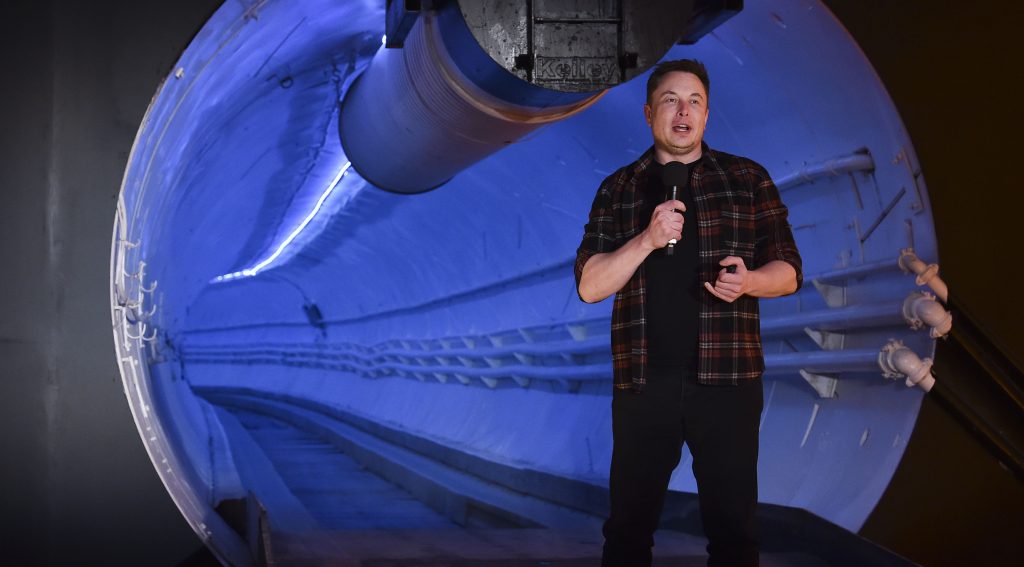
Elon Musk’s Boring Company is under scrutiny in Nevada after county and state regulators accused the company of nearly 800 alleged environmental violations tied to its Las Vegas tunnel project and issued roughly $736,000 in fines (1). Clark County officials say the company dumped drilling fluids into sewer infrastructure, while state inspectors allege everything from unapproved digging to months of missed inspections (2). The Boring Company has contested the violations.
The controversy centers on the Vegas Loop project, a planned 68-mile tunnel network meant to shuttle passengers in Teslas beneath Las Vegas. The Las Vegas Convention and Visitors Authority (LVCVA) first backed a 0.8-mile “people mover” under the convention center and later supported expanding the system across the valley (3).
Must Read
- Thanks to Jeff Bezos, you can now become a landlord for as little as $100 — and no, you don’t have to deal with tenants or fix freezers. Here’s how
- Dave Ramsey warns nearly 50% of Americans are making 1 big Social Security mistake — here’s what it is and 3 simple steps to fix it ASAP
- Warren Buffett used 8 solid, repeatable money rules to turn $9,800 into a $150B fortune. Start using them today to get rich (and stay rich)
Similar Boring Company proposals in Chicago and California fizzled once local officials pushed for comprehensive environmental studies and public feedback (4). In Las Vegas, the privately funded project has moved ahead without the kind of federal environmental review that typically applies to major transit systems, as it does not use any federal dollars (5).
That funding model has become a test case for Musk’s long-stated belief that regulators should punish violations after the fact rather than require lengthy approvals up front. This philosophy may now carry higher stakes for investors, workers and residents.
Why the Vegas Loop’s funding model matters
Clark County inspectors say they caught the company dumping drilling fluids into Las Vegas sewer manholes, while Nevada’s regulators accused Musk’s firm of “repeated and systematic noncompliance,” including 689 missed inspections (6).
The infractions lodged against the Boring Company show how privately funded megaprojects can circumvent the environmental oversight that public projects typically face. The Vegas Loop has avoided federal environmental reviews because it does not use taxpayer dollars (7). That gap lets projects move faster but also reduces accountability for pollution, workplace safety and community impacts.
At the state level, Nevada inspectors accused the company of violating a prior settlement agreement nearly 800 times over two years, including failing to hire a required independent environmental manager and skipping hundreds of required site inspections (8). Regulators said they could have sought more than $3 million in penalties but opted to reduce the fine to about $242,800, citing an “extraordinary number of violations” while still aiming to deter future misconduct.
"DEP has decided to exercise its discretion to reduce the penalty to two $5,000 violations per permit, which it believes offers a reasonable penalty that will still serve to deter future non-compliance conduct,” regulators from the Bureau of Water Pollution Control wrote in a Sept 22, 2025, cease and desist letter (9).
Read more: Robert Kiyosaki says this 1 asset will surge 400% in a year — and he begs investors not to miss its ‘explosion’
Pattern of violations could have long-reaching consequences
Beyond the fines and violations lies a bigger policy gap: because the Vegas Loop doesn’t rely on federal money, it hasn’t undergone the lengthy environmental impact reviews, public hearings, and alternatives analyses that typically shape large transit projects (10). That has allowed the system to advance more quickly, but with fewer opportunities for residents to weigh in on issues like groundwater protection, worker safety and neighborhood disruption.
The combined fines, while seemingly large, are relatively small for a company reportedly valued at around $7 billion. Still, the pattern of alleged violations, plus prior OSHA citations over chemical burns and “ankle-deep” water in tunnels, could threaten permits or slow expansion in other cities.
Municipal leaders and transit agencies watching the Las Vegas case unfold may now insist on tighter contracts, independent environmental monitors, or more traditional public-sector oversight before signing off on similar Boring Company projects.
For investors, the Nevada cases add another layer of regulatory and reputational risk to Musk’s broader business empire, alongside existing scrutiny of Tesla, SpaceX, and his other ventures. If more states or the federal government decide that privately financed megaprojects need public-style oversight, the speed advantage Boring relies on could erode.
For workers and nearby communities, the Vegas Loop case is a reminder that fast-moving tech projects still come with familiar trade-offs. Innovation can cut through red tape, but when regulators don’t keep up, the bill for pollution, workplace injuries, and emergency responses ultimately lands on the public.
What to read next
- Approaching retirement with no savings? Don’t panic, you’re not alone. Here are 6 easy ways you can catch up (and fast)
- Dave Ramsey says this 7-step plan ‘works every single time’ to kill debt, get rich — and ‘anyone’ can do it
- Grant Gardone reveals the ‘real problem’ with US real estate (and what average Americans must actually do to get rich)
- 22 US states are already in a recession — protect your savings with these 10 essential money moves ASAP
Join 200,000+ readers and get Moneywise’s best stories and exclusive interviews first — clear insights curated and delivered weekly. Subscribe now.
Article sources
We rely only on vetted sources and credible third-party reporting. For details, see our editorial ethics and guidelines.
City Cast Las Vegas (1); AOL (2); Waste Today (3); Fortune (4); Ars Technica (5); The Nevada Independent (6); TechCrunch (7); Water Education Foundation (8); Casino.org (9, 10)
This article provides information only and should not be construed as advice. It is provided without warranty of any kind.